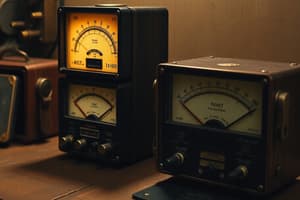Podcast
Questions and Answers
What is the primary function of a sensor?
What is the primary function of a sensor?
- To convert mechanical energy into electrical energy
- To convert physical quantities into electrical signals (correct)
- To generate data suitable for analysis
- To improve the quality of a product
What is the purpose of measurement?
What is the purpose of measurement?
- To improve the efficiency of production
- To generate data suitable for analysis
- To obtain information regarding physical values (correct)
- To maintain the proper operation
What is a transducer?
What is a transducer?
- A device that converts electrical energy into mechanical energy
- A device that improves the quality of a product
- A device that converts one form of energy into another (correct)
- A device that generates data suitable for analysis
What is the purpose of instrumentation?
What is the purpose of instrumentation?
What type of instrument is a temperature sensor?
What type of instrument is a temperature sensor?
What is an example of a mechanical instrument?
What is an example of a mechanical instrument?
What is the main difference between a sensor and an actuator?
What is the main difference between a sensor and an actuator?
Which of the following is NOT a reason why we need measurement?
Which of the following is NOT a reason why we need measurement?
What is the main advantage of using electronic transducers?
What is the main advantage of using electronic transducers?
Which type of instrument is a capacitance sensor?
Which type of instrument is a capacitance sensor?
What is the purpose of a physical quantity?
What is the purpose of a physical quantity?
Which of the following is an example of an indirect method of measurement?
Which of the following is an example of an indirect method of measurement?
What is the main difference between a parameter and a physical quantity?
What is the main difference between a parameter and a physical quantity?
What is the main advantage of using instrumentation in measurement systems?
What is the main advantage of using instrumentation in measurement systems?
Flashcards are hidden until you start studying
Study Notes
Measurement and Instrumentation
- Measurement: a method to obtain information about physical values of variables.
- Instrumentation: devices used in measurement systems.
Physical Quantities and Parameters
- Physical quantity: variables such as pressure, temperature, mass, and length.
- Parameter: a physical quantity within defined numeric limits.
Transducers, Sensors, and Actuators
- Transducer: a device that converts one form of energy to another.
- Electronic transducer: has input or output that is electrical in nature (voltage, current, or resistance).
- Sensor: an electronic transducer that converts physical quantities into electrical signals.
- Actuator: an electronic transducer that converts electrical energy into mechanical energy.
Importance of Measurement
- Improves the quality of the product.
- Improves the efficiency of production.
- Maintains proper operation.
Importance of Instrumentation
- Puts numerical values to physical quantities.
- Generates data suitable for analysis, mostly in electrical format.
Types of Measurement
- Direct method.
- Indirect method.
Types of Instruments
Mechanical Instruments
- Force sensors.
- Pressure sensors.
- Strain gauges.
- Displacement sensors.
- Velocity sensors.
Electrical Instruments
- Current sensors.
- Voltage sensors.
- Resistance sensors.
- Capacitance sensors.
Electronic Instruments
- Temperature sensors.
- Pressure sensors.
- Force sensors.
- Accelerometers.
Measurement and Instrumentation
- Measurement: a method to obtain information about physical values of variables.
- Instrumentation: devices used in measurement systems.
Physical Quantities and Parameters
- Physical quantity: variables such as pressure, temperature, mass, and length.
- Parameter: a physical quantity within defined numeric limits.
Transducers, Sensors, and Actuators
- Transducer: a device that converts one form of energy to another.
- Electronic transducer: has input or output that is electrical in nature (voltage, current, or resistance).
- Sensor: an electronic transducer that converts physical quantities into electrical signals.
- Actuator: an electronic transducer that converts electrical energy into mechanical energy.
Importance of Measurement
- Improves the quality of the product.
- Improves the efficiency of production.
- Maintains proper operation.
Importance of Instrumentation
- Puts numerical values to physical quantities.
- Generates data suitable for analysis, mostly in electrical format.
Types of Measurement
- Direct method.
- Indirect method.
Types of Instruments
Mechanical Instruments
- Force sensors.
- Pressure sensors.
- Strain gauges.
- Displacement sensors.
- Velocity sensors.
Electrical Instruments
- Current sensors.
- Voltage sensors.
- Resistance sensors.
- Capacitance sensors.
Electronic Instruments
- Temperature sensors.
- Pressure sensors.
- Force sensors.
- Accelerometers.
Studying That Suits You
Use AI to generate personalized quizzes and flashcards to suit your learning preferences.



